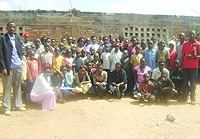After the 1994 Genocide against the Tutsi, many people’s lives changed. People thought differently, depending on the time effects. Some had to start life afresh, in a hard way. Others could not start life without a hand of help. Amongst the many who survived, some thought about life of the orphans, but had no effective way to help.


After the 1994 Genocide against the Tutsi, many people’s lives changed. People thought differently, depending on the time effects. Some had to start life afresh, in a hard way. Others could not start life without a hand of help.
Amongst the many who survived, some thought about life of the orphans, but had no effective way to help. Among those who managed to assist the orphans is Sylvestre Nzitukuze.
He says that by 1994 he was in the army (RPF), but after the Genocide, its effects forced him to resign army with an aim of helping street children.
"The 1994 Genocide against the Tutsi tremendously increased the number of street children in Kigali,” he said.
He says that he had a vision of helping the children who lost their parents to get off the streets, but his biggest worry was shortage of funds.
"With the little funds I had, I got some children from Nyabugogo Taxi Park.” He tried to find work for them to earn a living, but it reached a time when their number overwhelmed his ability.
"I had 20 children. At the time it was too much for me. I made efforts to get help from Celpar Church in Kacyiru. He explains that the church helped him to a certain extent, but the number kept growing.
The increased number forced him to shift to a new area at former El-Shaddai School and Orphanage near Nyabugogo.
"Staying in a half-open roof building, one day an American lady called Sandra Bagley who was working with the Medical services in the US Embassy, visited us.”
Bagley was touched with the children’s plight. She vowed to help them and for the entire year she spent in Rwanda, she provided aid. By the time she left for America, Nzitukuze had formed the Rwandan Orphans Project which supports the orphanage to-date.
It’s from that background that the Rwandan Orphans Project Centre (ROP) for street children in Nyabugogo exists.
As we commemorate the fifteenth year of the 1994 Genocide against the Tutsi, the orphanage caters for 170 children permanently staying at there. It accommodates only boys.
Nzitukuze says that due to lack of proper facilities at the orphanage, girls don’t reside there but join them during the day. The centre also has a primary school which is free for all children who contact the administration.
According to Pastor Celestin Mitabu, the Director and Chairman of the advisory committee of ROP Centre for the Street Children, is fighting for vulnerable children's rights.
"We have decided to help all those who lost their parents in the 1994 Genocide against the Tutsi, orphans whose parents died of Aids and those who have nothing in life,” he said. He explained that the orphanage has come up with many different works for children, to help them start their own lives.
"They can not stay in the orphanage all their lives. It has been therefore proved important to educate them, so that they can acquire knowledge that can help them to have an independent life.”
The orphanage caters for the well being of the orphans. It has quite a good number of sewing machines, which enabled it to start a tailoring school. Orphans acquire skills in making different types of clothes which are exported to the United States by ROP.
Mitabu said that the orphanage has a programme called "Catch up” which gives children who dropped out of school a chance to learn.
"The programme will soon be implemented to make sure that those children catch up with others.”
Among the orphanage’s success stories, are four children who graduated in mechanics from a technical school, ETO Muhima, with certificates. Two more boys graduated with diplomas.
"We are preparing these children for a better life which can console and make their minds forget all about the past,” Mitabu said.
The center has also introduced gardening, where various crops like maize, carrots, beans and Irish potatoes and vegetables are grown.
Animal and bird keeping is also carried out, goats, rabbits and chicken are kept.These are some of the ways through which the orphanage tries to create work for the orphans.
"This will help in exposing these children to life. By the time they go out to start their own life, they will be creative and able to challenge life,” Mitabu noted.
Ends


